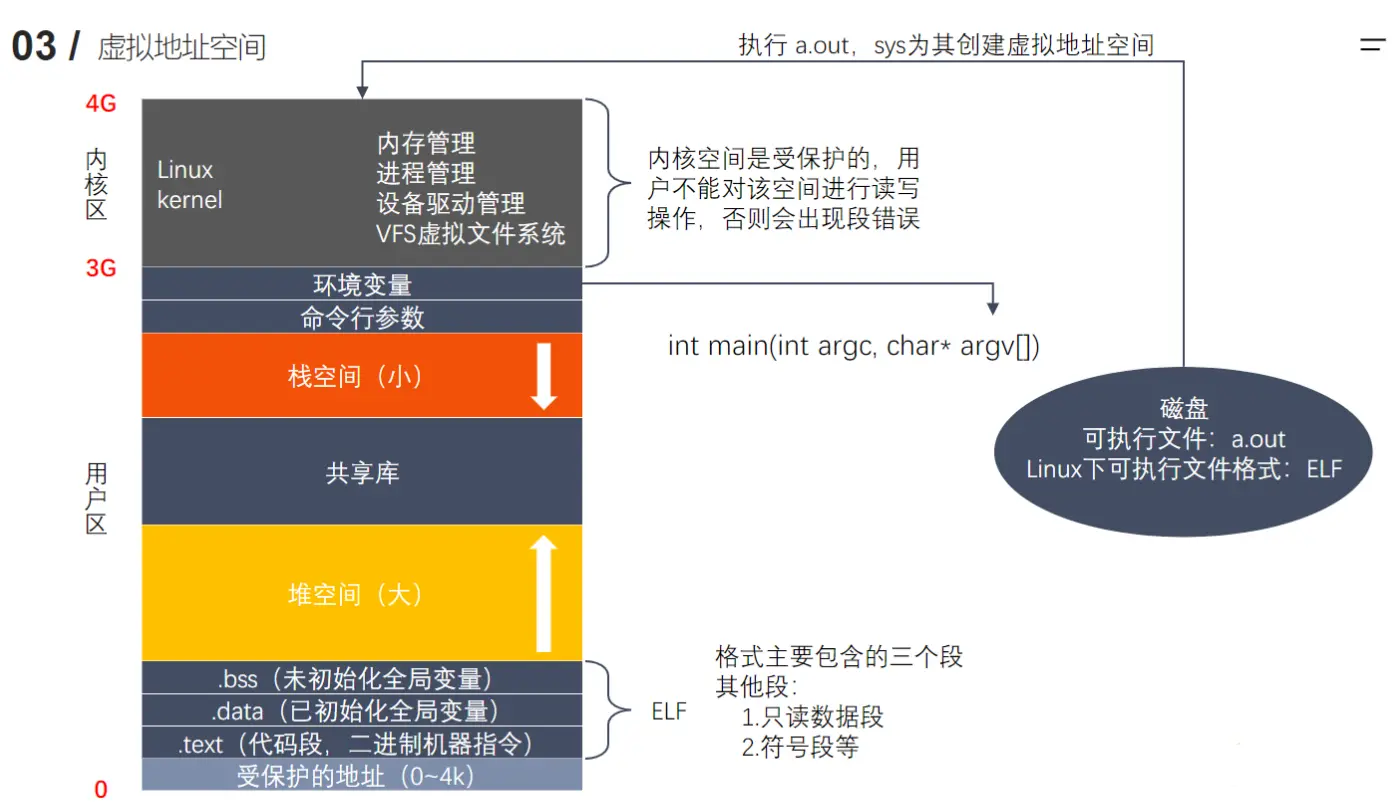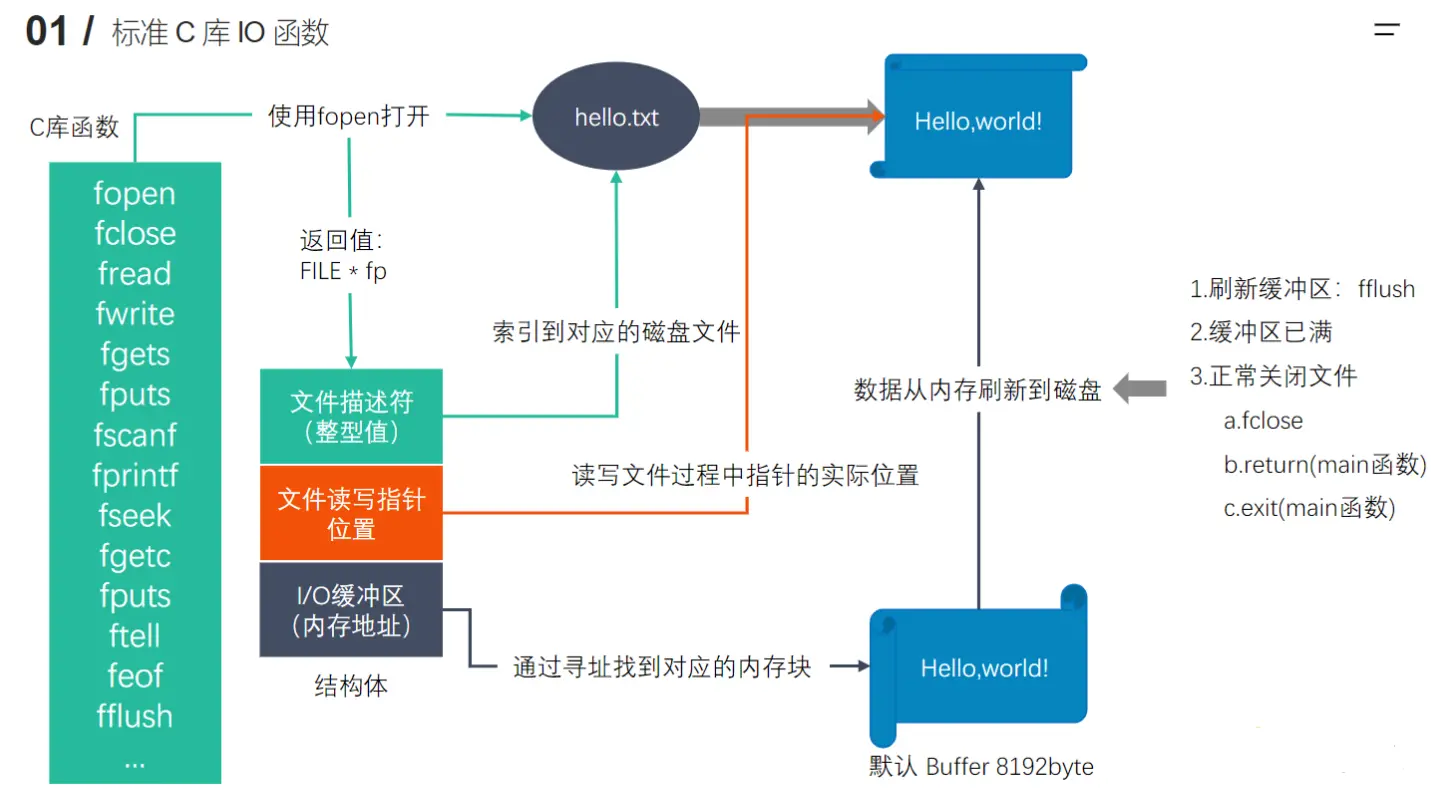本文介绍文件IO与标准IO的相关概念,以及一些常用的文件IO函数
基本概念
文件I/O:文件I/O称之为不带缓存的IO(unbuffered I/O)。不带缓存指的是每个read,write都调用内核中的一个系统调用。也就是一般所说的低级I/O——操作系统提供的基本IO服务,与os绑定,特定于linix或unix平台。
标准I/O:标准I/O是ANSI C建立的一个标准I/O模型,是一个标准函数包和stdio.h头文件中的定义,具有一定的可移植性。标准I/O库处理很多细节。例如缓存分配,以优化长度执行I/O等。标准的I/O提供了三种类型的缓存。
(1)全缓存:当填满标准I/O缓存后才进行实际的I/O操作。
(2)行缓存:当输入或输出中遇到新行符时,标准I/O库执行I/O操作。
(3)不带缓存:stderr就是了。
原理
文件I/O 又称为低级磁盘I/O,遵循POSIX相关标准。任何兼容POSIX标准的操作系统上都支持文件I/O。标准I/O被称为高级磁盘I/O,遵循ANSI C相关标准。只要开发环境中有标准I/O库,标准I/O就可以使用。(Linux 中使用的是GLIBC,它是标准C库的超集。不仅包含ANSI C中定义的函数,还包括POSIX标准中定义的函数。因此,Linux 下既可以使用标准I/O,也可以使用文件I/O)。




栈与堆的扩展方向
早期的微弱优势
早期的系统需要考虑有限内存下的内存布局问题。具体来说,内存的一端放置了静态代码和静态数据之后,剩余的区域,既需要动态数据,又需要可增长的栈,那么合理的方案就是各放一端向中间生长。现在的问题就是两个选项:静态内存放在哪端;栈是在静态内存的同端还是对端。
考虑下面的一些条件:
- 早期的部分机器,从0地址启动[1]。想象一下磁带机的编址。
- 动态数据从概念上来说,和静态数据比较像
所以从内存布局来说,一个自然的方案是,从0地址依次放置代码、静态数据、动态数据,高地址放置栈。
但是,从安全性来说,向低地址扩展也有微弱劣势:
- 数组、字符串越界时会覆盖过去栈帧的数据,黑客更容易找到缓冲区溢出攻击的漏洞
历史的实际情况
大部分CPU指令集设计了函数调用架构,定义了专用的调用/返回指令,并在指令中隐含规定栈的方向。
- 主流1:向低地址扩展:x86,MIPS
- 主流2:自由选择:Arm(但个别指令仅支持向低)
- 罕见:向高地址扩展:PA-RISC,操作系统Multics
- 非主流:System z,栈是个链表[2]
如果CPU同时支持向上和向下,例如arm,那么编译器需要指定程序的调用方向,一般还是选择向下。比较罕见的极端的案例是Multics操作系统,这是Unix的巨无霸前身,设计者刻意选用向高地址扩展,因为该架构有助于防御缓冲区溢出攻击[3]。
现代的情况
现代程序的下列特征,导致内存布局问题中的单个栈增长方向无所谓。
- 使用线性虚拟地址,进程空间为4G或者更高
- 现代程序写法,栈的大小1M左右已经足够使用。编译器一般都直接限制栈的大小
- 多线程导致有多个栈,所以堆-栈的两端分割模式是不合适的,每个栈应当有界
引用
作者:刘源
链接:https://www.zhihu.com/question/29520755/answer/373320074
来源:知乎
著作权归作者所有。商业转载请联系作者获得授权,非商业转载请注明出处。

open
1
2
3
4
5
6
7
8
9
10
11
12
13
14
15
16
17
18
19
20
21
22
23
24
25
26
27
28
29
30
31
32
33
34
35
36
37
38
39
40
41
42
43
44
45
46
47
48
49
50
51
52
53
|
/*
#include <sys/types.h>
#include <sys/stat.h>
#include <fcntl.h>
// 打开一个已经存在的文件
int open(const char *pathname, int flags);
参数:
- pathname:要打开的文件路径
- flags:对文件的操作权限设置还有其他的设置
O_RDONLY, O_WRONLY, O_RDWR 这三个设置是互斥的
返回值:返回一个新的文件描述符,如果调用失败,返回-1
errno:属于Linux系统函数库,库里面的一个全局变量,记录的是最近的错误号。
#include <stdio.h>
void perror(const char *s);作用:打印errno对应的错误描述
s参数:用户描述,比如hello,最终输出的内容是 hello:xxx(实际的错误描述)
// 创建一个新的文件
int open(const char *pathname, int flags, mode_t mode);
参数:
- pathname:要创建的文件的路径
- flags:对文件的操作权限和其他的设置
- 必选项:O_RDONLY, O_WRONLY, O_RDWR 这三个之间是互斥的
- 可选项:O_CREAT 文件不存在,创建新文件
- mode:八进制的数,表示创建出的新的文件的操作权限,比如:0775
最终的权限是:mode & ~umask
0777 -> 111111111
& 0775 -> 111111101
----------------------------
111111101
按位与:0和任何数都为0
umask的作用就是抹去某些权限。
flags参数是一个int类型的数据,占4个字节,32位。
flags 32个位,每一位就是一个标志位。
*/
#include <sys/types.h>
#include <sys/stat.h>
#include <fcntl.h>
#include <stdio.h>
#include <unistd.h>
int main() {
// 打开一个文件
int fd = open("a.txt", O_RDONLY);
if(fd == -1) {
perror("open");
}
// 读写操作
// 关闭
close(fd);
return 0;
}
|
read & write
1
2
3
4
5
6
7
8
9
10
11
12
13
14
15
16
17
18
19
20
21
22
23
24
25
26
27
28
29
30
31
32
33
34
35
36
37
38
39
40
41
42
43
44
45
46
47
48
49
50
51
52
53
54
55
56
57
|
/*
#include <unistd.h>
ssize_t read(int fd, void *buf, size_t count);
参数:
- fd:文件描述符,open得到的,通过这个文件描述符操作某个文件
- buf:需要读取数据存放的地方,数组的地址(传出参数)
- count:指定的数组的大小
返回值:
- 成功:
>0: 返回实际的读取到的字节数
=0:文件已经读取完了
- 失败:-1 ,并且设置errno
#include <unistd.h>
ssize_t write(int fd, const void *buf, size_t count);
参数:
- fd:文件描述符,open得到的,通过这个文件描述符操作某个文件
- buf:要往磁盘写入的数据,数据
- count:要写的数据的实际的大小
返回值:
成功:实际写入的字节数
失败:返回-1,并设置errno
*/
#include <unistd.h>
#include <stdio.h>
#include <sys/types.h>
#include <sys/stat.h>
#include <fcntl.h>
int main() {
// 1.通过open打开english.txt文件
int srcfd = open("english.txt", O_RDONLY);
if(srcfd == -1) {
perror("open");
return -1;
}
// 2.创建一个新的文件(拷贝文件)
int destfd = open("cpy.txt", O_WRONLY | O_CREAT, 0664);
if(destfd == -1) {
perror("open");
return -1;
}
// 3.频繁的读写操作
char buf[1024] = {0};
int len = 0;
while((len = read(srcfd, buf, sizeof(buf))) > 0) {
write(destfd, buf, len);
}
// 4.关闭文件
close(destfd);
close(srcfd);
return 0;
}
|
lseek
1
2
3
4
5
6
7
8
9
10
11
12
13
14
15
16
17
18
19
20
21
22
23
24
25
26
27
28
29
30
31
32
33
34
35
36
37
38
39
40
41
42
43
44
45
46
47
48
49
50
51
52
53
54
55
56
57
58
59
60
61
62
63
64
65
66
67
68
|
/*
标准C库的函数
#include <stdio.h>
int fseek(FILE *stream, long offset, int whence);
Linux系统函数
#include <sys/types.h>
#include <unistd.h>
off_t lseek(int fd, off_t offset, int whence);
参数:
- fd:文件描述符,通过open得到的,通过这个fd操作某个文件
- offset:偏移量
- whence:
SEEK_SET
设置文件指针的偏移量
SEEK_CUR
设置偏移量:当前位置 + 第二个参数offset的值
SEEK_END
设置偏移量:文件大小 + 第二个参数offset的值
返回值:返回文件指针的位置
作用:
1.移动文件指针到文件头
lseek(fd, 0, SEEK_SET);
2.获取当前文件指针的位置
lseek(fd, 0, SEEK_CUR);
3.获取文件长度
lseek(fd, 0, SEEK_END);
4.拓展文件的长度,当前文件10b, 110b, 增加了100个字节
lseek(fd, 100, SEEK_END)
注意:需要写一次数据
*/
#include <sys/types.h>
#include <sys/stat.h>
#include <fcntl.h>
#include <unistd.h>
#include <stdio.h>
int main() {
int fd = open("hello.txt", O_RDWR);
if(fd == -1) {
perror("open");
return -1;
}
// 扩展文件的长度
int ret = lseek(fd, 100, SEEK_END);
if(ret == -1) {
perror("lseek");
return -1;
}
// 写入一个空数据
write(fd, " ", 1);
// 关闭文件
close(fd);
return 0;
}
|
stat
1
2
3
4
5
6
7
8
9
10
11
12
13
14
15
16
17
18
19
20
21
22
23
24
25
26
27
28
29
30
31
32
33
34
35
36
37
38
39
40
41
42
43
44
45
|
/*
#include <sys/types.h>
#include <sys/stat.h>
#include <unistd.h>
int stat(const char *pathname, struct stat *statbuf);
作用:获取一个文件相关的一些信息
参数:
- pathname:操作的文件的路径
- statbuf:结构体变量,传出参数,用于保存获取到的文件的信息
返回值:
成功:返回0
失败:返回-1 设置errno
int lstat(const char *pathname, struct stat *statbuf);
参数:
- pathname:操作的文件的路径
- statbuf:结构体变量,传出参数,用于保存获取到的文件的信息
返回值:
成功:返回0
失败:返回-1 设置errno
*/
#include <sys/types.h>
#include <sys/stat.h>
#include <unistd.h>
#include <stdio.h>
int main() {
struct stat statbuf;
int ret = stat("a.txt", &statbuf);
if(ret == -1) {
perror("stat");
return -1;
}
printf("size: %ld\n", statbuf.st_size);
return 0;
}access
|
access
1
2
3
4
5
6
7
8
9
10
11
12
13
14
15
16
17
18
19
20
21
22
23
24
25
26
27
28
|
/*
#include <unistd.h>
int access(const char *pathname, int mode);
作用:判断某个文件是否有某个权限,或者判断文件是否存在
参数:
- pathname: 判断的文件路径
- mode:
R_OK: 判断是否有读权限
W_OK: 判断是否有写权限
X_OK: 判断是否有执行权限
F_OK: 判断文件是否存在
返回值:成功返回0, 失败返回-1
*/
#include <unistd.h>
#include <stdio.h>
int main() {
int ret = access("a.txt", F_OK);
if(ret == -1) {
perror("access");
}
printf("文件存在!!!\n");
return 0;
}
|
chmod
1
2
3
4
5
6
7
8
9
10
11
12
13
14
15
16
17
18
19
20
21
22
23
|
/*
#include <sys/stat.h>
int chmod(const char *pathname, mode_t mode);
修改文件的权限
参数:
- pathname: 需要修改的文件的路径
- mode:需要修改的权限值,八进制的数
返回值:成功返回0,失败返回-1
*/
#include <sys/stat.h>
#include <stdio.h>
int main() {
int ret = chmod("a.txt", 0777);
if(ret == -1) {
perror("chmod");
return -1;
}
return 0;
}
|
truncate
1
2
3
4
5
6
7
8
9
10
11
12
13
14
15
16
17
18
19
20
21
22
23
24
25
26
27
|
/*
#include <unistd.h>
#include <sys/types.h>
int truncate(const char *path, off_t length);
作用:缩减或者扩展文件的尺寸至指定的大小
参数:
- path: 需要修改的文件的路径
- length: 需要最终文件变成的大小
返回值:
成功返回0, 失败返回-1
*/
#include <unistd.h>
#include <sys/types.h>
#include <stdio.h>
int main() {
int ret = truncate("b.txt", 5);
if(ret == -1) {
perror("truncate");
return -1;
}
return 0;
}
|
chdir & getcwd
1
2
3
4
5
6
7
8
9
10
11
12
13
14
15
16
17
18
19
20
21
22
23
24
25
26
27
28
29
30
31
32
33
34
35
36
37
38
39
40
41
42
43
44
45
46
47
48
49
50
51
52
53
54
55
|
/*
#include <unistd.h>
int chdir(const char *path);
作用:修改进程的工作目录
比如在/home/nowcoder 启动了一个可执行程序a.out, 进程的工作目录 /home/nowcoder
参数:
path : 需要修改的工作目录
#include <unistd.h>
char *getcwd(char *buf, size_t size);
作用:获取当前工作目录
参数:
- buf : 存储的路径,指向的是一个数组(传出参数)
- size: 数组的大小
返回值:
返回的指向的一块内存,这个数据就是第一个参数
*/
#include <unistd.h>
#include <stdio.h>
#include <sys/stat.h>
#include <sys/types.h>
#include <fcntl.h>
int main() {
// 获取当前的工作目录
char buf[128];
getcwd(buf, sizeof(buf));
printf("当前的工作目录是:%s\n", buf);
// 修改工作目录
int ret = chdir("/home/nowcoder/Linux/lesson13");
if(ret == -1) {
perror("chdir");
return -1;
}
// 创建一个新的文件
int fd = open("chdir.txt", O_CREAT | O_RDWR, 0664);
if(fd == -1) {
perror("open");
return -1;
}
close(fd);
// 获取当前的工作目录
char buf1[128];
getcwd(buf1, sizeof(buf1));
printf("当前的工作目录是:%s\n", buf1);
return 0;
}
|
mkdir
1
2
3
4
5
6
7
8
9
10
11
12
13
14
15
16
17
18
19
20
21
22
23
24
25
26
27
|
/*
#include <sys/stat.h>
#include <sys/types.h>
int mkdir(const char *pathname, mode_t mode);
作用:创建一个目录
参数:
pathname: 创建的目录的路径
mode: 权限,八进制的数
返回值:
成功返回0, 失败返回-1
*/
#include <sys/stat.h>
#include <sys/types.h>
#include <stdio.h>
int main() {
int ret = mkdir("aaa", 0777);
if(ret == -1) {
perror("mkdir");
return -1;
}
return 0;
}
|
opendir & readdir & closedir
1
2
3
4
5
6
7
8
9
10
11
12
13
14
15
16
17
18
19
20
21
22
23
24
25
26
27
28
29
30
31
32
33
34
35
36
37
38
39
40
41
42
43
44
45
46
47
48
49
50
51
52
53
54
55
56
57
58
59
60
61
62
63
64
65
66
67
68
69
70
71
72
73
74
75
76
77
78
79
80
81
82
83
84
85
86
87
88
89
90
91
92
93
94
95
96
|
/*
// 打开一个目录
#include <sys/types.h>
#include <dirent.h>
DIR *opendir(const char *name);
参数:
- name: 需要打开的目录的名称
返回值:
DIR * 类型,理解为目录流
错误返回NULL
// 读取目录中的数据
#include <dirent.h>
struct dirent *readdir(DIR *dirp);
- 参数:dirp是opendir返回的结果
- 返回值:
struct dirent,代表读取到的文件的信息
读取到了末尾或者失败了,返回NULL
// 关闭目录
#include <sys/types.h>
#include <dirent.h>
int closedir(DIR *dirp);
*/
#include <sys/types.h>
#include <dirent.h>
#include <stdio.h>
#include <string.h>
#include <stdlib.h>
int getFileNum(const char * path);
// 读取某个目录下所有的普通文件的个数
int main(int argc, char * argv[]) {
if(argc < 2) {
printf("%s path\n", argv[0]);
return -1;
}
int num = getFileNum(argv[1]);
printf("普通文件的个数为:%d\n", num);
return 0;
}
// 用于获取目录下所有普通文件的个数
int getFileNum(const char * path) {
// 1.打开目录
DIR * dir = opendir(path);
if(dir == NULL) {
perror("opendir");
exit(0);
}
struct dirent *ptr;
// 记录普通文件的个数
int total = 0;
while((ptr = readdir(dir)) != NULL) {
// 获取名称
char * dname = ptr->d_name;
// 忽略掉. 和..
if(strcmp(dname, ".") == 0 || strcmp(dname, "..") == 0) {
continue;
}
// 判断是否是普通文件还是目录
if(ptr->d_type == DT_DIR) {
// 目录,需要继续读取这个目录
char newpath[256];
sprintf(newpath, "%s/%s", path, dname);
total += getFileNum(newpath);
}
if(ptr->d_type == DT_REG) {
// 普通文件
total++;
}
}
// 关闭目录
closedir(dir);
return total;
}
|
dup
1
2
3
4
5
6
7
8
9
10
11
12
13
14
15
16
17
18
19
20
21
22
23
24
25
26
27
28
29
30
31
32
33
34
35
36
37
38
39
40
41
42
43
44
|
/*
#include <unistd.h>
int dup(int oldfd);
作用:复制一个新的文件描述符
fd=3, int fd1 = dup(fd),
fd指向的是a.txt, fd1也是指向a.txt
从空闲的文件描述符表中找一个最小的,作为新的拷贝的文件描述符
*/
#include <unistd.h>
#include <stdio.h>
#include <fcntl.h>
#include <sys/types.h>
#include <sys/stat.h>
#include <string.h>
int main() {
int fd = open("a.txt", O_RDWR | O_CREAT, 0664);
int fd1 = dup(fd);
if(fd1 == -1) {
perror("dup");
return -1;
}
printf("fd : %d , fd1 : %d\n", fd, fd1);
close(fd);
char * str = "hello,world";
int ret = write(fd1, str, strlen(str));
if(ret == -1) {
perror("write");
return -1;
}
close(fd1);
return 0;
}
|
dup2
1
2
3
4
5
6
7
8
9
10
11
12
13
14
15
16
17
18
19
20
21
22
23
24
25
26
27
28
29
30
31
32
33
34
35
36
37
38
39
40
41
42
43
44
45
46
47
48
49
50
51
52
53
54
|
/*
#include <unistd.h>
int dup2(int oldfd, int newfd);
作用:重定向文件描述符
oldfd 指向 a.txt, newfd 指向 b.txt
调用函数成功后:newfd 和 b.txt 做close, newfd 指向了 a.txt
oldfd 必须是一个有效的文件描述符
oldfd和newfd值相同,相当于什么都没有做
*/
#include <unistd.h>
#include <stdio.h>
#include <string.h>
#include <sys/stat.h>
#include <sys/types.h>
#include <fcntl.h>
int main() {
int fd = open("1.txt", O_RDWR | O_CREAT, 0664);
if(fd == -1) {
perror("open");
return -1;
}
int fd1 = open("2.txt", O_RDWR | O_CREAT, 0664);
if(fd1 == -1) {
perror("open");
return -1;
}
printf("fd : %d, fd1 : %d\n", fd, fd1);
int fd2 = dup2(fd, fd1);
if(fd2 == -1) {
perror("dup2");
return -1;
}
// 通过fd1去写数据,实际操作的是1.txt,而不是2.txt
char * str = "hello, dup2";
int len = write(fd1, str, strlen(str));
if(len == -1) {
perror("write");
return -1;
}
printf("fd : %d, fd1 : %d, fd2 : %d\n", fd, fd1, fd2);
close(fd);
close(fd1);
return 0;
}
|
fcntl
1
2
3
4
5
6
7
8
9
10
11
12
13
14
15
16
17
18
19
20
21
22
23
24
25
26
27
28
29
30
31
32
33
34
35
36
37
38
39
40
41
42
43
44
45
46
47
48
49
50
51
52
53
54
55
56
57
58
59
60
61
62
63
64
|
/*
#include <unistd.h>
#include <fcntl.h>
int fcntl(int fd, int cmd, ...);
参数:
fd : 表示需要操作的文件描述符
cmd: 表示对文件描述符进行如何操作
- F_DUPFD : 复制文件描述符,复制的是第一个参数fd,得到一个新的文件描述符(返回值)
int ret = fcntl(fd, F_DUPFD);
- F_GETFL : 获取指定的文件描述符文件状态flag
获取的flag和我们通过open函数传递的flag是一个东西。
- F_SETFL : 设置文件描述符文件状态flag
必选项:O_RDONLY, O_WRONLY, O_RDWR 不可以被修改
可选性:O_APPEND, O)NONBLOCK
O_APPEND 表示追加数据
NONBLOK 设置成非阻塞
阻塞和非阻塞:描述的是函数调用的行为。
*/
#include <unistd.h>
#include <fcntl.h>
#include <stdio.h>
#include <string.h>
int main() {
// 1.复制文件描述符
// int fd = open("1.txt", O_RDONLY);
// int ret = fcntl(fd, F_DUPFD);
// 2.修改或者获取文件状态flag
int fd = open("1.txt", O_RDWR);
if(fd == -1) {
perror("open");
return -1;
}
// 获取文件描述符状态flag
int flag = fcntl(fd, F_GETFL);
if(flag == -1) {
perror("fcntl");
return -1;
}
flag |= O_APPEND; // flag = flag | O_APPEND
// 修改文件描述符状态的flag,给flag加入O_APPEND这个标记
int ret = fcntl(fd, F_SETFL, flag);
if(ret == -1) {
perror("fcntl");
return -1;
}
char * str = "nihao";
write(fd, str, strlen(str));
close(fd);
return 0;
}
|





